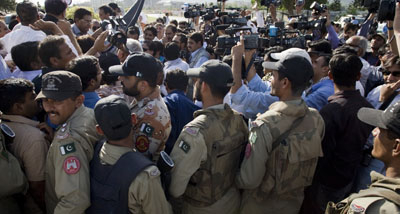In Pakistan, the term “a war of words” can take on a menacing dimension beyond the metaphorical. Words–written, spoken, or reported–regularly land journalists in trouble, a very literal, physical sort of trouble. Reporters have become accustomed to being threatened, and over the years they’ve seen threats sometimes build to abductions, beatings, and even death. Such violence seldom comes without a string of prior warnings.
The verbal threats come from all quarters, as do the physical. Government agencies have been unable to protect journalists, and in some cases, but definitely not all, they are among the prime suspects for making the threats, and carrying out the abductions and beatings and even the murders. For many months, CPJ has been writing about threats and encouraging journalists, as an act of self-defense, to make them widely known.
The murder of Saleem Shahzad at the end of May 2011 is currently the bellwether, though there were many highly publicized cases before his. And since Shahzad’s death, there have been three more targeted killings–Mukarram Khan Aatif in January 2012, apparently at the hand of a Taliban-related group; Javed Naseer Rind, a Baloch journalist and political activist killed in November 2011, whose killers remain unidentified; and Faisal Qureshi, whose staunchly partisan website The London Post in October 2011 had run a scathing series of stories on the Muttahida Qaumi Movement shortly before men slashed his throat in his apartment in Lahore. All three men had been repeatedly threatened before they were killed.
Almost for sure, here come some more threats. In an editorial in The Friday Times, “Overreach and miscalculation,” Najam Sethi, a CPJ award winner who is no stranger to threats himself, mentions Shahzad’s death in passing as he itemizes recent setbacks to the credibility of the Pakistani military and security establishment. The media, Sethi says, in part,
is also resentful about its manipulation by the ISI [Inter-Services Intelligence] viz drone policy, the Raymond Davis affair and Memogate. Question marks abound over its incompetence or complicity in the OBL [Osama bin Laden] affair, especially following recent revelations by former [Director-General of the] ISI Ziauddin Butt that General Pervez Musharraf “hid” Osama bin Laden in Abbottabad. The murder of journalist Saleem Shahzad, followed by threats to independent journalists, is laid at the ISI’s door. The ease with which terrorists have breached military security, as in the attacks on GHQ, ISI offices, military messes, Mehran Naval Base, and army officers etc also rankle. Finally, the media is now speaking up and asking disturbing questions about the role of [Military Intelligence] and related non-state actors in the disappearances and torture of Baloch activists. Consequently, the media is loath to blindly follow the army’s “line” on any issue any more.
With the perpetrators still at large even after a full-scale, six-month judicial inquiry, the Shahzad case continues to resonate, generating a continuing war of words. On January 30, Human Rights Watch released a statement headlined “Shahzad Commission Results Marred by Free Ride for ISI.” On Thursday, the Inter-Services Public Relations directorate issued its rebuttal, “Human Rights Watch (HRW) Report on Judicial Commission on Saleem Shehzad Murder Case Not Correct,” in which it launches an attack on Brad Adams, the executive director of Human Rights Watch’s Asia Division. While Adams himself “may have his head buried deep in the sand,” the ISPR says, HRW’s “press release in question is part of a well-orchestrated and sinister media campaign, in which HRW and the likes of Brad Adams and Ali Dayan Hassan [HRW’s country representative] may have been unwittingly drawn into.”
In an editorial, “A Sharp Riposte,” The Express Tribune rose to HRW’s defense Saturday:
The response of the ISPR to a report by the New York-based Human Rights Watch (HRW)–which suggested that the ISI hindered the investigation into the death of journalist Saleem Shahzad in May last year–is rather alarming in its tone and tenor.
And on the same day, in a blog in The Express Tribune headlined “We killed Saleem Shahzad,” liberal guest blogger Sana Saleem criticized the judicial report itself:
Since the judicial inquiry has been unable to identify people responsible, it is time we step forward. We killed Saleem Shahzad. If you read the report carefully, it lays the blame on us. It blames us for doubting the country’s intelligence agencies for the murder of a journalist, because of course, they can never be held in doubt, let alone be responsible, or worse be at fault.
CPJ’s position all along has been that such judicial inquiries are inconclusive–see “Justice for Saleem Shahzad? We’ve seen this before.” What is needed is a standard police investigation, not the convening of a high-powered judicial commission, no matter how well-intentioned. As CPJ has said incessantly, in only one case, that of the murder of American Wall Street Journal reporter Daniel Pearl in 2002, have the killers of a journalist ever been brought to trial and sentenced in Pakistan. The investigation into Pearl’s death and the subsequent trial and sentencing, though flawed, serve as a high-water mark for Pakistani jurisprudence. Saleem Shahzad’s death remains unresolved, just as the many others over the years. And threats to Pakistani journalists don’t let up.
